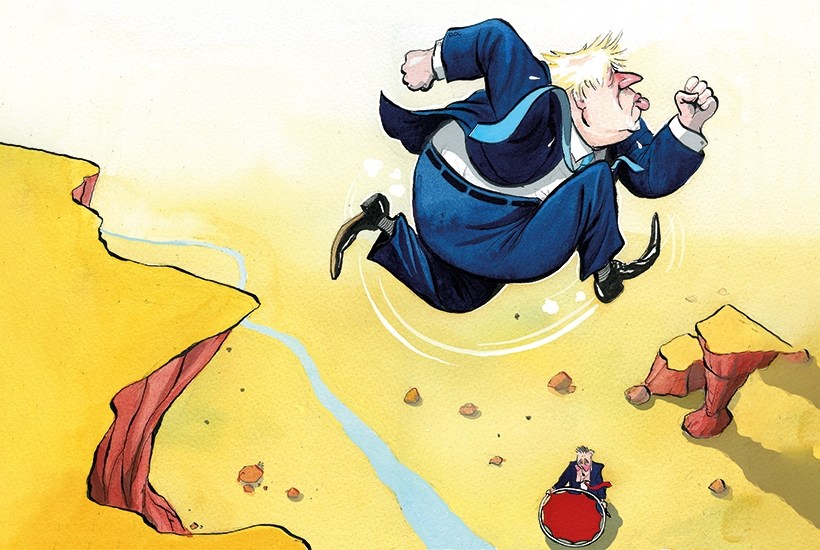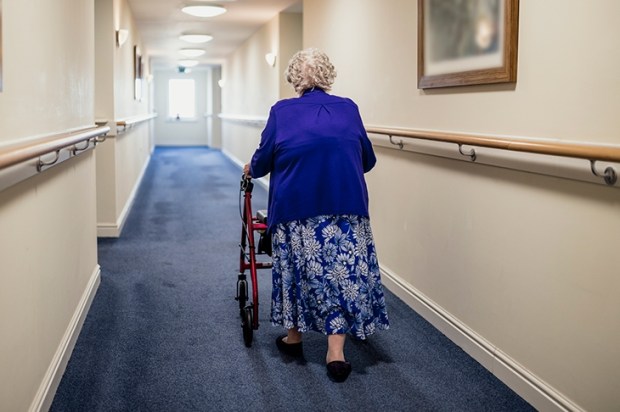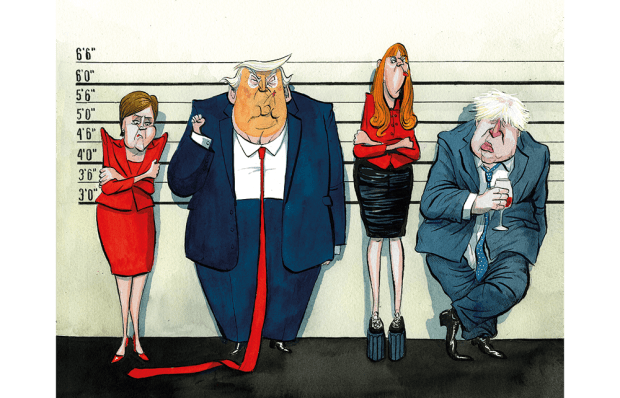The Prime Minister is thought to thrive on chaos. If so, then he should be in his element. Wholesale gas prices have risen sixfold, winter heating bills are set to be the highest on record. Millions of people across the country are wondering what they might have to forgo to pay for heat. Supermarkets are warning of food shortages. There are 100,000 missing HGV drivers. The army has been called in to help, but has only 150 tanker drivers available. Queues for petrol jam the roads, and medics can’t get to work.
The Prime Minister might thrive on chaos, but Tory members do not. ‘Tory grassroots are furious,’ says one MP. Not just about the prospect of energy bills rising, but about the increase to National Insurance too. ‘The general public may not be fuming over tax hikes yet, but our membership is not happy.’
If it was a Tory policy that had backfired, that would be one thing. But price caps for energy bills was an idea launched by Ed Miliband in the 2013 Labour party conference. The Tories first opposed it (‘Marxist,’ said David Cameron), then they stole it, assuming it would prove popular. But the problem with price caps is that when costs rise and companies can’t raise prices accordingly, they go bust. That’s exactly what’s happening now: Avro Energy, Green, People’s Energy, Utility Point, PfP Energy and Money Plus Energy have all collapsed. More companies may well follow.
This is becoming a trend: Tories win power, then lurch to the left to maintain it. Bad policies then have bad effects, causing the kind of chaos that was once associated with Labour misrule.
There were reasons to think, early on, that Johnson’s government might be different. When he re-entered Downing Street with his 80-seat majority, there was a strong implication that his premiership was the start of something new. The Tory voter profile had transformed, incorporating far more working-class support. Johnson’s ideological rhetoric around free markets and free people differed drastically from his predecessor’s: where Theresa May saw the dangers of an ‘unfettered free market’, Johnson praised a ‘dynamic’ mechanism for increasing prosperity and funding public services.
But then Covid came along and inspired in Johnson a big–government approach, exacerbated by emergency measures that blurred the lines between the private sector and the state. The creep of high-spend, huge-debt ideas into the party has been accelerated rather than reversed by his government.
‘We’re in decline,’ says one Tory MP. ‘It happens gradually, and then suddenly.’ But why, when there’s effectively no opposition? Labour — gifted with an energy crisis and a deployment of the army during party conference season — have once again failed to land blows on the government. ‘The assumption is that Labour can’t win because the party’s gone to pieces. And that may be true,’ says the MP. ‘But Labour doesn’t need to be great. Economic forces may still tear down the house.’
Which economic forces? Take your pick: gas prices, rising fuel demand, the labour market crunch, NHS capacity and waiting lists, inflationary pressures. The virus exposed a myriad of places where provision is being held together by a string.
While it’s true that there’s a Europe-wide fall in truck driver numbers (lured to Amazon-style home delivery jobs), there is a homegrown aspect to Britain’s driver shortage which has attracted less attention. During lockdown, the testing of new HGV drivers collapsed, and no one thought about the implications. In a typical January, about 3,000 licences are granted. This January, it was just 173. Overall, just 24,600 drivers were approved last year — some 17,000 fewer than in a typical year. ‘Grant Shapps should have seen this coming,’ says one minister. ‘He should have realised delivery is critical to infrastructure. He’s lucky people are blaming Brexit.’
It’s just one of many failures of government during lockdown. At the peak of the pandemic, demand for NHS beds fell to the lowest on record, as the government pledged to ‘protect’ the service from any additional strain: at the start of April last year, 40 per cent of all hospital beds were empty. But the NHS now faces a backlog of 5.6 million hospital treatments (and counting) which may take years to clear. ‘It’s a disaster,’ another Tory MP says bluntly. ‘I don’t get how you’re going to reduce waiting times sufficiently without reform — that is, reform that isn’t more centralisation.’
The problem is a lack of resilience, a lack of forethought and the lack of any serious Plan B. Until Covid hit, it was almost a point of pride that NHS hospital capacity operates at close to 100 per cent every February. The response to a winter crisis is often reframed as evidence of efficiency: one of the few metrics where the NHS tends to rank decently in international comparisons of healthcare systems. Eleven years of Tory health secretaries have not changed a system that is capable of giving a better return on the cash spent.
The coming National Insurance tax rise will certainly make the NHS more expensive, but it won’t provide a single extra bed for the elderly or fix the crisis it’s intended to address. Rather than think of how to reform the system, the Tories reached for a decade-old idea given to David Cameron (the Dilnot report) and forced it through parliament. It’s hard to find a single MP who believes this will fix the social care crisis or that voters will see results for the extra tax they’ll be charged. Yet again, it’s a problem deferred.
And now it’s the army that is asked to pick up the slack. To send troops out into the streets used to be a sign of panic. Now, it’s a semi-regular occurrence. The army has been deployed to build the NHS Nightingale hospitals, to conduct mass testing in Liverpool, to deliver and roll out vaccinations. Soldiers are currently driving ambulances in Scotland, and processing HGV licences in England. But the British army was never intended as a civil contingencies corps or a crutch for government to lean on when other attempts to run the country fail.
The surest form of resilience is to keep debt low, so it can be run up in an emergency. But instead the Tories have borrowed as much as they dared. It’s just about possible with interest rates so low, but what if they rise? The whole spending splurge is based on a bet that inflation won’t take off — and that gamble looks riskier by the week. If inflation and interest rates rose by a single percentage point — to a level that would still be very low by historical standards — annual UK interest payments would rise by £25 billion by 2024-25. Rishi Sunak worked to hedge against this in his March budget, but with the Bank of England now expecting inflation to peak above 4 per cent (twice the official target), it’s easy to see the contours of a new crisis.
This hasn’t stopped the Prime Minister from splashing the cash, though he has at least been persuaded to do so partly with tax rises rather than run it all on the national debt. This focused the mind: his choice was between lower taxes (and spending restraint) or splurging and adding to the highest tax burden in 70 years. He went for the latter.
Sound familiar? Labour may be too busy to provide opposition as it focuses on tearing itself apart. But the party has other problems too: criticising the Tories increasingly means criticising its own tax-and-spend, rack-up-debt philosophy.
But the lack of political scrutiny won’t stop the public from noticing that something has gone badly wrong: that since the country has begun to emerge from the Covid crisis, pledges to ‘build back better’ and ‘level up’ have instead delivered escalating shortages and increasing uncertainty.
Where are the big ideas to help the nation recover? Possibly they’re lurking within the Conservative party, but they’re unlikely to be discovered in time for the party’s conference. Instead we’ll be presented with a Prime Minister who is running on empty, recycling old ideas and borrowing from across the aisle, and hoping somehow to get away with it.
Got something to add? Join the discussion and comment below.
Get 10 issues for just $10
Subscribe to The Spectator Australia today for the next 10 magazine issues, plus full online access, for just $10.
You might disagree with half of it, but you’ll enjoy reading all of it. Try your first month for free, then just $2 a week for the remainder of your first year.















Comments
Don't miss out
Join the conversation with other Spectator Australia readers. Subscribe to leave a comment.
SUBSCRIBEAlready a subscriber? Log in